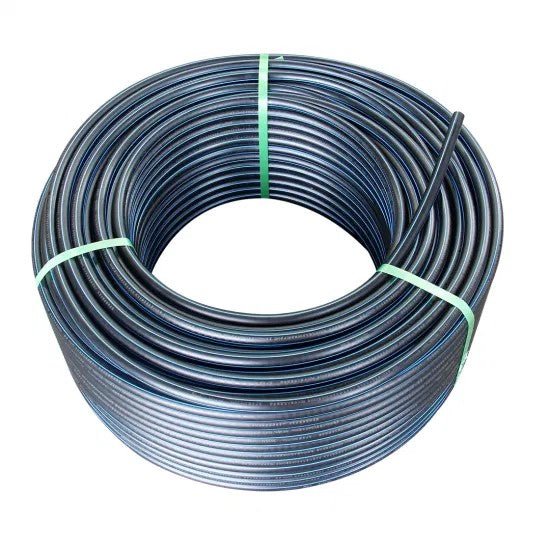Texas hdpe pipe manufacturer: Eco-Friendly Practices
Wiki Article
Understanding the Trick Benefits of HDPE Pipeline for Water and Wastewater Administration
Using HDPE pipeline in water and wastewater management offers various benefits that warrant consideration. Its extraordinary toughness and lengthy life-span make it a preferred selection for many projects. Additionally, the product's resistance to rust and chemical damage improves its reliability in various atmospheres. The benefits prolong beyond simply long life and resistance. Midland TX HDPE Pipe Fittings in Stock. Discovering its cost-effectiveness and ecological influence exposes much more engaging factors for its extensive adoption in modern facilitiesOutstanding Resilience and Longevity

HDPE pipe stands out for its exceptional durability and durability, making it a recommended option in water monitoring systems. Built from high-density polyethylene, these pipelines can endure considerable stress and stress and anxiety, guaranteeing reliable performance in time. Their durable nature allows them to sustain severe environmental conditions, consisting of temperature variations and dirt activities, which can trigger various other products to fail.
The life-span of HDPE pipelines usually exceeds half a century, supplying a cost-efficient solution for communities and sectors alike. Furthermore, the product's light-weight residential or commercial properties streamline setup, minimizing labor prices and timeframes. This durability reduces the demand for regular repair services or replacements, better boosting its economic allure.
In water management applications, the dependability of HDPE pipes indicates fewer disruptions and boosted service connection, making them integral to lasting infrastructure advancement. The combination of toughness and long life strengthens HDPE's role as a foundation in effective water administration services.

Resistance to Corrosion and Chemical Damage
While lots of products yield to corrosion and chemical damages with time, HDPE pipes exhibit amazing resistance, making them excellent for different water monitoring applications. This resilience originates from the molecular structure of high-density polyethylene, which is inherently non-reactive and does not wear away like metals or deteriorate from direct exposure to harsh chemicals. Therefore, HDPE is highly efficient in environments with aggressive compounds, such as wastewater systems that may include acids, bases, and organic solvents.
Additionally, HDPE pipes can hold up against environmental aspects such as dirt level of acidity and saline conditions, better boosting their viability for varied applications (hdpe pipe in stock Midland TX). Their ability to preserve architectural stability gradually minimizes the danger of leaks and failures, which is essential in making sure the safety and integrity of water distribution and wastewater monitoring systems. The resistance to corrosion and chemical damage noticeably adds to the total efficiency and long life of HDPE piping solutions.
Cost-Effectiveness and Economic Advantages
When taking into consideration the monetary implications of water monitoring systems, the cost-effectiveness of HDPE pipelines becomes evident. These pipelines provide reduced setup and maintenance prices contrasted to conventional products like metal or concrete. Their lightweight nature streamlines transport and setup, leading to reduced labor expenses. In addition, HDPE pipelines display a long life expectancy, commonly going beyond half a century, which equates to fewer replacements and long-lasting savings.The resistance of HDPE to deterioration and chemical damage lessens the need for expensive repairs and replacements. The pipelines also support efficient water flow, lowering energy expenses related to pumping systems. By mitigating leaks and water loss, HDPE pipelines add to significant financial advantages for municipalities and markets alike. Overall, the initial financial investment in HDPE piping can generate substantial financial returns over the life expectancy of the water administration system, making it a sensible choice for sustainable facilities growth.
Environmental Sustainability and Decreased Effect

Versatility and Flexibility in Installment
Due to their special properties, HDPE pipelines provide amazing versatility and adaptability in setup, making them suitable for a vast array of applications. Their lightweight nature permits simpler handling and transportation, reducing labor prices and installation time. HDPE pipelines can be curved and formed to fit different terrains and task demands, which is particularly beneficial in testing atmospheres.Additionally, their resistance to deterioration and chemical damage permits installment in diverse settings without the need for specialized safety finishings. The capacity to fuse joints develops a web link continual, leak-free system, improving the general honesty and dependability of the installment. HDPE's flexibility likewise suits ground activity, minimizing the threat of damage in areas vulnerable to shifting soil. In general, these features make HDPE pipes not just versatile but likewise a recommended choice for water and wastewater management systems.
Often Asked Inquiries
Just How Does HDPE Pipe Contrast to PVC in Water Management Applications?
HDPE pipeline uses premium flexibility, resistance to corrosion, and longevity compared to PVC. Its lighter weight facilitates less complicated installation, while its long life-span lowers substitute prices, making HDPE a favored option in water administration applications.What Is the Life Expectancy of HDPE Piping Under Regular Conditions?
Under typical conditions, HDPE pipelines can have a life expectancy ranging from 50 to 100 years. Their sturdiness and resistance to rust add to their long-lasting efficiency in different applications, making them a reliable option for infrastructure.Are HDPE Piping Recyclable After Their Life Span?
Yes, HDPE pipelines are recyclable after their life span. Texas hdpe pipe manufacturer. They can be refined and these details repurposed into new items, considerably decreasing ecological effect and promoting sustainability within the sector, making them an eco-friendly selection for piping remediesWhat Is the Installment Process for HDPE Pipes?
The installment procedure for HDPE pipes involves website preparation, trenching, pipe blend or mechanical signing up with, backfilling, and stress testing. Correct techniques guarantee a resilient and effective system for transporting water and wastewater efficiently.Can HDPE Pipeline Be Utilized for Both Drinkable and Non-Potable Water Systems?
Yes, HDPE pipes can be made use of for both safe and clean and non-potable water supply. Their convenience, durability, and resistance to deterioration make them ideal for numerous applications, making certain secure and effective transport of water in different contexts.Report this wiki page